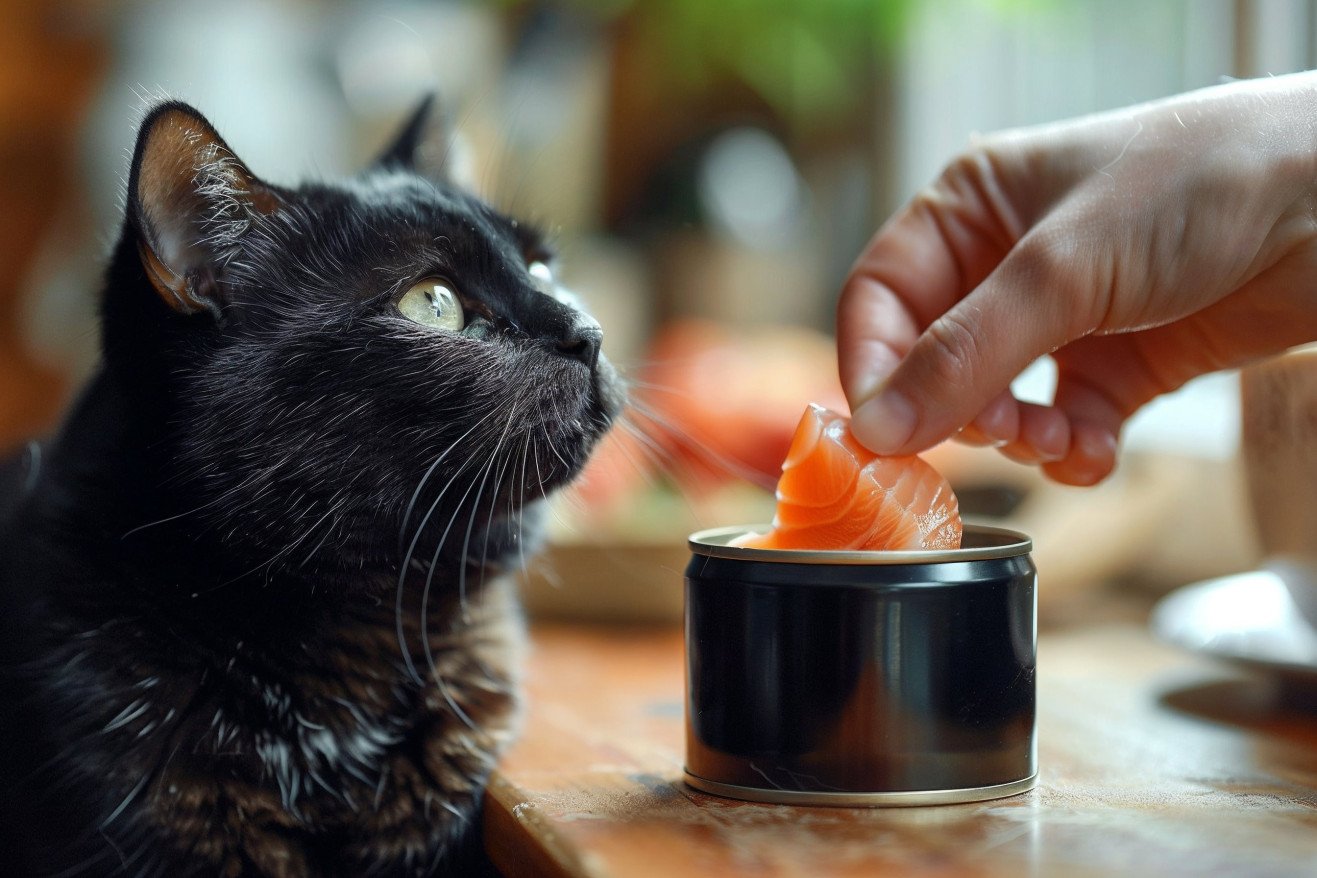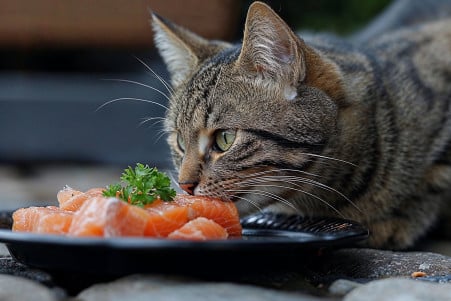Can Cats Eat Canned Salmon? Risks and Benefits Explained
13 April 2024 • Updated 13 April 2024

Your cat may be drawn to the smell and taste of canned salmon, but there are some risks and benefits to be aware of before you decide to share your favorite fishy snack. Cats can eat canned salmon in moderation as an occasional treat. However, it should be boneless, skinless, and free of any oils, sauces, or seasonings that could be toxic. Because of the potential for high sodium and mercury content, it's best to limit the amount of salmon your cat eats to ensure it's a small part of a well-rounded diet.
By looking at information from veterinary experts and scientific research, we will cover the nutritional factors to consider when it comes to cats and salmon. This article is designed to give you a complete understanding of how to safely feed your cat canned salmon while making sure you're taking care of their nutritional needs. You'll learn about the right portion sizes, potential pitfalls, and best practices to make sure your cat is getting the most out of this tasty and nutritious food.
Can cats eat canned salmon?
Nutritional Benefits of Canned Salmon for Cats
Canned salmon can be a healthy part of your cat's diet in small amounts. It's an excellent source of protein, which is just what your cat needs as an obligate carnivore. According to the Alaskan Salmon Co., salmon is also a source of omega-3 fatty acids, which are good for your cat's skin, coat, and brain health.
Salmon is also a source of vitamins and minerals such as vitamin D, vitamin B12, and selenium, all of which are important for your cat's health, according to the Redbarn Pet Products. That said, canned salmon should be used as an occasional treat or supplement to a balanced, complete cat food diet.
As far as how much to give your cat, vets suggest that salmon treats should be limited to about 1/20th of a filet or a teaspoon for the average 10-pound cat, according to the Alaskan Salmon Co. This is about 30 calories, or 10% of your cat's daily caloric intake from treats. More than this can lead to obesity and other health problems.
In short, while canned salmon is a great source of protein, healthy fats, and important vitamins and minerals, it's important to use it in a way that makes it a part of a balanced diet. That means using it in moderation so that your cat can get the benefits without throwing off their overall nutrition.
Potential Dangers and Downsides of Feeding Canned Salmon to Cats
In addition to the many potential benefits of feeding canned salmon to cats, there are also some potential downsides and dangers that cat owners should be aware of. According to the JustAnswer forum, canned salmon is often high in sodium, which can lead to sodium poisoning if it is consumed in large amounts. This can cause a number of health problems for cats.
Another potential downside is thiamine (vitamin B1) deficiency. The forum post explains that fish contains an enzyme that can destroy this essential nutrient, which can lead to neurological issues if it is not treated.
Moreover, research from Trickyfish points out that some types of canned salmon can be contaminated with mercury, which can be poisonous to cats. This is especially problematic for cats that already have health issues.
Cats can also experience stomach upset or allergies if they are not used to eating fish. VCA Animal Hospitals notes that it is important to feed cats fish in moderation and to talk to a vet before making any major changes to their diet in order to keep your cat safe and healthy.
How to Identify and Treat Salmon Allergies in Cats
Cats can be allergic to certain proteins, including salmon, leading to skin problems, gastrointestinal symptoms, and respiratory distress. According to PetMD, common signs of a salmon allergy in cats include itching, hair loss, vomiting, and diarrhea.
The most reliable way to diagnose a food allergy is to perform an elimination diet trial, which is described by PetMD. This means feeding the cat an extremely limited hypoallergenic diet for 8 to 12 weeks to see if the symptoms improve. In the best case scenario, this will be a home-prepared diet with a novel protein source. In other cases, a novel protein or hydrolyzed diet may be prescribed.
RawzNaturalPetFood.com notes that it's important to see a vet to get a proper diagnosis and treatment, which may include a prescription hypoallergenic diet. To avoid and treat salmon allergies, it's important to steer clear of any and all salmon products and keep a close eye on the cat for any symptoms of an allergic reaction.
By learning to recognize the symptoms of salmon allergies and seeking help from a vet, cat owners can make sure their pets can eat canned salmon as an occasional treat without experiencing any negative side effects.
Canned Salmon: A Healthy and Safe Cat Treat
As noted by Cooper Pet Care, canned salmon can be a convenient option for cat owners, but there are a couple of things to keep in mind. First, it's important to make sure that the canned salmon you choose doesn't have any added salt or spices, which can be toxic to cats. Second, make sure to remove any small bones that are often present in canned salmon to avoid a choking hazard.
Petcube recommends that you avoid commercial cat foods that contain salmon, as the fish is often farm-raised and can be high in pollutants and toxins. Instead, they recommend giving your cat a special treat of grilled, poached, or baked salmon that doesn't have any added seasonings.
When it comes to giving canned salmon as an occasional treat, Alaskan Salmon Co. suggests that you limit the portion to about 1/20th of a filet or a teaspoon for an average 10-pound cat. This is about 30 calories or 10% of their daily caloric intake from treats. It's also important to make sure that you introduce cats to the new food slowly and watch for any signs of an adverse reaction.
For cats who may not be able to tolerate canned salmon, Cooper Pet Care recommends that you look into salmon oil supplements as an alternative way to get the benefits of omega-3 fatty acids without the risks associated with the whole fish. This can be a good option for cat owners who want to make sure that their cats can eat salmon in a way that's safe and easy to control.
Things to Know Before Feeding Canned Salmon to Kittens and Cats With Health Issues
Kittens and cats with health issues have specific needs and concerns when it comes to eating canned salmon. While Animal Gator notes that canned salmon can be a healthy treat for adult cats, it may not be safe for kittens or cats with certain health issues.
Kittens, for example, may not be able to tolerate the high protein and fat content of canned salmon, which could lead to digestive issues and other health problems. VCA Animal Hospitals warns that it’s important to talk to a veterinarian before introducing new food to kittens, who are still growing and developing.
Cats with kidney disease are especially sensitive to the phosphorus in canned salmon, which can be harmful to their health, according to Trickyfish. Phosphorus can put extra stress on the kidneys, which are already weakened by kidney disease, and make the condition worse. In these cases, a low-phosphorus renal diet is a better option.
Cats with other health issues, such as food allergies or intolerances, may benefit from a diet that includes a variety of protein sources and supplements, according to Only Natural Pet. A homemade diet that’s been approved by a veterinarian is another option.
In general, it’s important to monitor kittens and cats with health issues closely and work with a veterinarian to make sure they’re eating a diet that meets their needs. Changing their diet without professional guidance could have serious consequences for their health and well-being.
Conclusion: Weighing the Pros and Cons of Canned Salmon for Cats
Canned salmon can offer some nutritional benefits for cats, but it also comes with some potential downsides that cat owners need to be aware of. This article has covered the most important factors to consider, including the protein, fatty acid, and vitamin content of the salmon, as well as the potential downsides of sodium, mercury, and allergies.
It’s important to control the amount of canned salmon that cats eat and to talk to a vet before making any major changes to their diet. Canned salmon should be used to supplement a balanced, complete cat food diet, not replace it. Owners should also consider their cat’s age, health, and other factors when deciding whether to give them this fish as an occasional treat.
Being a responsible pet owner and prioritizing the health and well-being of cats is important when it comes to feeding them. By understanding the ins and outs of canned salmon consumption, cat owners can make informed choices that will help their feline friends live their best lives.


